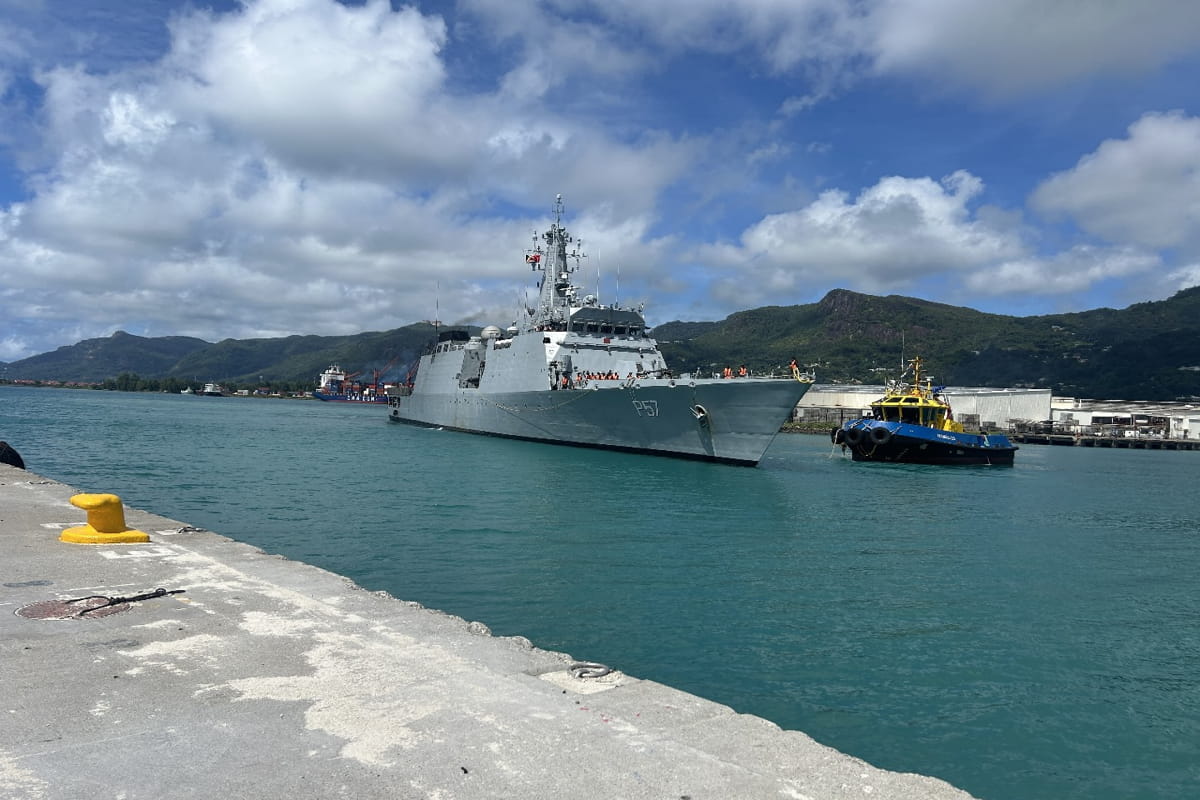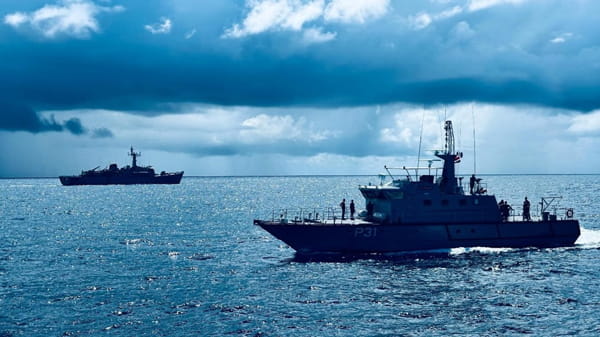
INS Sunayna makes a port call in Seychelles for her long-range deployment in the South West Indian Ocean Region to maintain security and growth for all in the region, June 2024. | Indian Ministry of Defence

The strategic partnership that has taken place between India and Seychelles can provide immense avenues and opportunities for the two nations to further cooperate in matters of maritime safety and security. It is through the combined integration of distinctive strengths and resources that both countries can further help the creation of regional stability and prosperity.
Introduction
The Indian Ocean region holds an extremely important position strategically because of the large sea-lanes that serve global trade. It is an extensive marine expanse from eastern Africa to western Australia that contains critical energy supplies and commercial flows, bringing the major economies of Asia, Africa, and the Middle East into contact with Europe and the Americas. The security and stability become important for the strategic importance of the region as to its vulnerabilities, as well as territorial disputes.
Maritime security and safety in the Indian Ocean provide for safe passage with respect to the freeway of trade and stability in the region. However, the high rate of piracy, illegal fishing, and the significant magnitude of smuggling, along with the threats imposed on maritime activity, calls for the highest level of security. Besides, the security landscape is complicated by environmental hazards, including oil spills and pollution of the marine environment, further giving importance due to the need for comprehensive maritime governance for the same purpose.
India and Seychelles are two important geopolitical actors placed in the Indian Ocean. India is a significant maritime power, owing to its long coastline and strong naval forces. Seychelles, on the other hand, is an archipelago in the Western Indian Ocean where significant maritime communication routes pass through, which therefore has vital interests in maritime security. The economy of Seychelles relies heavily on the rich maritime resources of fisheries and tourism, as it has a large exclusive economic zone.
India and Seychelles: Strategic Partners
The rich history of relations and diplomacy between India and Seychelles, therefore, provides a firm foundation for the two countries to cooperate on various fronts, including marine security. Today, the robust strategic partnership between India and Seychelles draws strength from the past, mutual interests, and the growing importance of geopolitics. The two countries’ relations have developed over decades, marked by cooperation in various key areas, with a primary focus on maritime security. The bilateral relations lie between India and Seychelles, which date back to 1976 when Seychelles gained its independence. The level of closeness these relations have is further marked by high-level visits, cooperation at the economic level, and cultural exchanges.
Opportunities for Enhanced Cooperation
The strategic partnership that has taken place between India and Seychelles can provide immense avenues and opportunities for the two nations to further cooperate in matters of maritime safety and security. It is through the combined integration of distinctive strengths and resources that both countries can further help the creation of regional stability and prosperity. These include:
Timely collaboration between the two in the raising of security issues will help both in overcoming common challenges for the enhancement of regional stability and development.

Exercise Cutlass Express at Port Victoria Source: Public Information Bureau
Obstacles to effective cooperation
Equally important would be the challenges that have been rising and hence can be detrimental to the effectiveness and sustainability of such efforts. Accordingly, these challenges need to be mitigated as and when they come for building on the full potential of this strategic partnership.
Political and diplomatic challenges can change the dynamics of bilateral cooperation. For example, the change in the political leadership or foreign policy priorities in either of the countries may affect the continuity and the effectiveness of the mutually agreed cooperative agenda. For example, political complications within the country or international diplomatic frictions may lead to delays or even cancellations of the agreed projects and activities. The continuity and strengthening of the political will from both political institutions enable the sustained pace of bilateral collaborative initiatives.
Issues of resource constraints and limitations to capacities for joint initiatives are similar for both India and Seychelles. While India has the capability to deal with maritime issues arising from several other aspects, it indeed needs to balance the allocation of resources and the attention given on more than one front - considering its extended neighbourhood and domestic needs. On the other hand, with a smaller economy and limited defence budget, Seychelles might face challenges in sustaining operations in maritime security and infrastructure development within this sector.
More importantly, the Indian Ocean Region is a zone of complex regional dynamics, hosting multiple external powers whose strategic interests will complicate overtly any signs of displayed bilateral cooperation. Their involvement, which has major rivalries like China and the United States, is likely to bring some tough competition on board and foster mistrust. The way forward in these regional rivalries and the careful management of external influences require adept diplomacy and strategic foresight.
Future Prospects and Recommendations
The cooperation between India and Seychelles in enhancing maritime safety and security can be said to have a bright future, provided both nations are able to navigate through the challenges strategically and leverage the innate opportunities for deepened levels of engagement.
The emphasis of this is that it makes it necessary for there to be a formal, high-level dialogue and consultations on mechanisms of sustained engagement and timely responses to emergent challenges. This is not taking place through the government officials alone and would have to involve representations by the navy, coast guard, and other relevant officers. It makes it easier to coordinate and align priorities during the formulation of strategies.
The involvement of the private sector in infrastructure and maritime security brings additional investment, innovation, and expertise. Developing ports, enhancing surveillance capabilities, and promoting eco-friendly maritime practices are some of the areas in which public-private partnerships can be extremely instrumental. Encouraging private sector participation can complement governmental efforts and drive sustainable growth.
Cooperation in research related to monitoring and interventions of environmental threats, such as climate change and marine pollution, results in several benefits. In addition, the formulation of joint research centres or programmes aids in sharing of knowledge and resources, hence arriving at sound policies and disaster response mechanisms in environmental protection. Furthermore, research initiatives focused on peace and security within the region can enhance mutual understanding and develop comprehensive strategies to address common threats, thereby strengthening the overall security architecture in the Indian Ocean region.
Implementation of these recommendations will really help enhance mutual maritime cooperation between India and Seychelles and contribute to regional stability and security. Efforts will go to address common threats and open new opportunities between both nations for more economic growth and sustainable development in the region of the Indian Ocean.
Conclusion
Indeed, the future of the partnership between India and Seychelles in the Indian Ocean seems very promising. Capitalising on historical relations and common interests, and identifying fresh areas of collaboration, will pave the way for both nations to work closely together in the larger interest of regional stability, security, and prosperity. Such higher coordination not only addresses common maritime threats but also opens new avenues for growth and development for labour and sustainability within the Indian Ocean region.
(Exclusive to NatStrat)